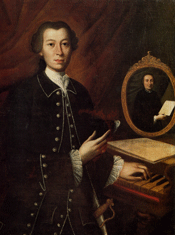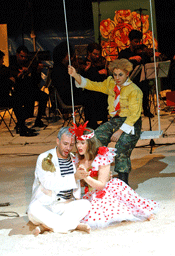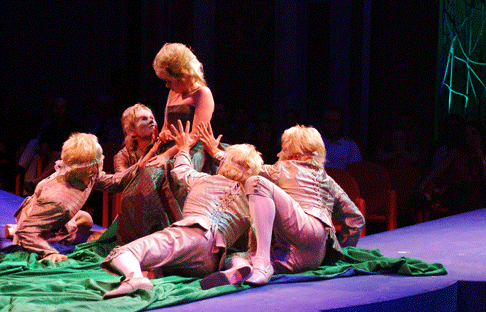
21 Jun 2009
Claudio Abbado Introduces the Complete Pergolesi
Very little is known about Giovanni Battista Draghi (or Drago, according to certain sources), known as Pergolesi.
English Touring Opera are delighted to announce a season of lyric monodramas to tour nationally from October to December. The season features music for solo singer and piano by Argento, Britten, Tippett and Shostakovich with a bold and inventive approach to making opera during social distancing.
This tenth of ten Live from London concerts was in fact a recorded live performance from California. It was no less enjoyable for that, and it was also uplifting to learn that this wasn’t in fact the ‘last’ LfL event that we will be able to enjoy, courtesy of VOCES8 and their fellow vocal ensembles (more below …).
Ever since Wigmore Hall announced their superb series of autumn concerts, all streamed live and available free of charge, I’d been looking forward to this song recital by Ian Bostridge and Imogen Cooper.
The Sixteen continues its exploration of Henry Purcell’s Welcome Songs for Charles II. As with Robert King’s pioneering Purcell series begun over thirty years ago for Hyperion, Harry Christophers is recording two Welcome Songs per disc.
Although Stile Antico’s programme article for their Live from London recital introduced their selection from the many treasures of the English Renaissance in the context of the theological debates and upheavals of the Tudor and Elizabethan years, their performance was more evocative of private chamber music than of public liturgy.
In February this year, Albanian soprano Ermonela Jaho made a highly lauded debut recital at Wigmore Hall - a concert which both celebrated Opera Rara’s 50th anniversary and honoured the career of the Italian soprano Rosina Storchio (1872-1945), the star of verismo who created the title roles in Leoncavallo’s La bohème and Zazà, Mascagni’s Lodoletta and Puccini’s Madama Butterfly.
Evidently, face masks don’t stifle appreciative “Bravo!”s. And, reducing audience numbers doesn’t lower the volume of such acclamations. For, the audience at Wigmore Hall gave soprano Elizabeth Llewellyn and pianist Simon Lepper a greatly deserved warm reception and hearty response following this lunchtime recital of late-Romantic song.
Collapsology. Or, perhaps we should use the French word ‘Collapsologie’ because this is a transdisciplinary idea pretty much advocated by a series of French theorists - and apparently, mostly French theorists. It in essence focuses on the imminent collapse of modern society and all its layers - a series of escalating crises on a global scale: environmental, economic, geopolitical, governmental; the list is extensive.
For this week’s Live from London vocal recital we moved from the home of VOCES8, St Anne and St Agnes in the City of London, to Kings Place, where The Sixteen - who have been associate artists at the venue for some time - presented a programme of music and words bound together by the theme of ‘reflection’.
'Such is your divine Disposation that both you excellently understand, and royally entertaine the Exercise of Musicke.’
Amongst an avalanche of new Mahler recordings appearing at the moment (Das Lied von der Erde seems to be the most favoured, with three) this 1991 Mahler Second from the 2nd Kassel MahlerFest is one of the more interesting releases.
‘And there was war in heaven: Michael and his angels fought against the dragon; and the dragon fought and his angels, And prevailed not; neither was their place found any more in heaven … that old serpent … Satan, which deceiveth the whole world: he was cast out into the earth, and his angels were cast out with him.’
If there is one myth, it seems believed by some people today, that probably needs shattering it is that post-war recordings or performances of Wagner operas were always of exceptional quality. This 1949 Hamburg Tristan und Isolde is one of those recordings - though quite who is to blame for its many problems takes quite some unearthing.
There was never any doubt that the fifth of the twelve Met Stars Live in Concert broadcasts was going to be a palpably intense and vivid event, as well as a musically stunning and theatrically enervating experience.
‘Love’ was the theme for this Live from London performance by Apollo5. Given the complexity and diversity of that human emotion, and Apollo5’s reputation for versatility and diverse repertoire, ranging from Renaissance choral music to jazz, from contemporary classical works to popular song, it was no surprise that their programme spanned 500 years and several musical styles.
The Academy of St Martin in the Fields have titled their autumn series of eight concerts - which are taking place at 5pm and 7.30pm on two Saturdays each month at their home venue in Trafalgar Square, and being filmed for streaming the following Thursday - ‘re:connect’.
The London Symphony Orchestra opened their Autumn 2020 season with a homage to Oliver Knussen, who died at the age of 66 in July 2018. The programme traced a national musical lineage through the twentieth century, from Britten to Knussen, on to Mark-Anthony Turnage, and entwining the LSO and Rattle too.
With the Live from London digital vocal festival entering the second half of the series, the festival’s host, VOCES8, returned to their home at St Annes and St Agnes in the City of London to present a sequence of ‘Choral Dances’ - vocal music inspired by dance, embracing diverse genres from the Renaissance madrigal to swing jazz.
Just a few unison string wriggles from the opening of Mozart’s overture to Le nozze di Figaro are enough to make any opera-lover perch on the edge of their seat, in excited anticipation of the drama in music to come, so there could be no other curtain-raiser for this Gala Concert at the Royal Opera House, the latest instalment from ‘their House’ to ‘our houses’.
"Before the ending of the day, creator of all things, we pray that, with your accustomed mercy, you may watch over us."

Very little is known about Giovanni Battista Draghi (or Drago, according to certain sources), known as Pergolesi.
He was born in Jesi — also the birthplace of Gaspare Spontini — on January 4th 1710 to a poor family (and most likely affected by many hereditary diseases). At a young age he left the small and pleasant little town on the Marche hills near the Adriatic Coast to move to Naples. There he studied at the San Pietro in Majella Conservatory. Upon graduation, he found employment as a musician and composer with a family, the Maddaloni, closely linked to the Austrians and thus not on good terms with the new powers-to-be in Naples (the Spaniards). He died young , at the age of 26, in a Monastery near Pozzuoli, in the suburbs of Naples. In his short life, he composed several opera serias, Church music and intermezzos. He was, it seems, well-known and appreciated in Naples and Rome (where the Maddaloni family went to find shelter when the Spanish Bourbons took over the Government in the Southern State).
He became internationally known several years after his premature death when his intermezzo La Serva Padrona, generally credited as the first opera buffa, precipitated a major artistic controversy (la Guerre des Bouffons) in France as well as elsewhere in Europe in the decades immediately preceding the Revolution. The first performance of La Serva Padrona in Naples in 1733 passed unnoticed; it was performed as a intermeszzo among the three acts of the opera seria Il Prigionier Superbo. La Serva Padrona was produced in Graz in 1739 by an Italian touring company without much notice. Its big splash was in Paris in 1752. Then, it provoked such a tumult of enthusiasm that it can be said to have caused a revolution in French opera; it played to almost full houses for nearly three years. At that time, French opera dominated and domineered European stage. The plot of La Serva Padrona is simple and satiric. Most of the dialogue is written the rapid recitative secco , unknown elsewhere in Europe except for Naples. The real charm of the short two parts intermezzo resides in the set numbers arias and duets where comedy and pathos intermingle. It was a real shock in Paris where the baroque opera was at its sunset and the tragédie lyrique was losing his hold. La Serva Padrona became an opportunity to inveigh against tradition and to promote the new culture of free expression of feelings- in short, to bring enlightenment to the opera stage and to the opera houses. The philosopher Jacques Rousseau became the leader of the movement; he himself composed an opera buffa in the new style, Le Diven du Village.
 A scene from La Serva Padrona
A scene from La Serva Padrona
Internationally, Pergolesi is mostly known for La Serva Padrona and two of his sacred pieces, Salve Regina and Stabat Mater, but he was a prolific composer in his brief life; at least six operas, mostly opera serias, are attributed to him. For the 300th anniversary of his birth, the Jesi-based Pergolesi Foundation has the ambitious program to stage all of them; the six operas will be staged in Pozzuoli, where, as already mentioned, the composer died.
It is fair to say that only two of the six operas would be new productions. In the last few years, the Foundation has already staged four of them in programs co-produced with the Festival of Radio France in Montpellier and with the Baroque Festival of Beaune as well as with the theaters of Modena, Piacenza, Ravenna, Reggio Emilia and Treviso. The full schedule is available at www.fondazionepergolesispontini.com and summarized at the end of this article.
 A scene from L’Olimpiade
A scene from L’Olimpiade
A jump start to the festival was, on June 5th, a concert of the Mozart Orchestra with Claudio Abbado conducting a fine group of soloists and the Swiss Radio Chorus. The concert was performed in the lovely Pergolesi Theatre in Jesi, with live and free maxi-screen video on the main square of the town. Only the initial number of the concert came from an opera, the aria Manca la guida al piè from the Neapolitan music drama Li Prodigi della Divina Grazia nella Conversione e Morte di San Guglielmo, a dramatic play Pergolesi composed when he was 21. The play has never been staged in modern time; it is programmed for December 2010 as a part of the performances of Pergolesi’s complete oeuvre. The rest of the concert was devoted to Church music with the Missa in F major taking up the entire second part. Abbado conducted with sublime elegance. All the soloists were of high standard, especially the alto Sara Mingardo. The audience was enthusiastic.
Our readers are most likely more interested in the operatic full immersion in Jesi and Pozzuoli than in a review of concert. I have seen in Jesi all the four productions that will be revived as a part of 2010 program. All of them are of high quality and show a Pergolesi very different than the composer generally known to international audience - mostly through La Serva Padrona, Salve Regina and Stabat Mater. I would recommend especially two of the four operas: La Salustia and L’Olimpiade. The former is one of the early opera seria by Pergolesi: it is passionate, nearly lascivious (also due to the staging by Jean-Paul Scarpitta), and thus very modern as compared to the standard and style of the time. The latter uses the Metastasio libretto previously set to music by Vivaldi, Galuppi and others, but it is unusually powerful in capturing friendship and competition among two young men; the staging of Italo Nunziata is a dramatic masterpiece.
Giuseppe Pennisi
The Opera performances in Jesi:
Il Prigionier Superbo- 11-12 September 2009 La Serva Padrona - 11- 12 September 2009 Il Flaminio - 4-6 June 2010 Adriano in Siria - 10’-12 June 2010 Livetta and Tracollo - 10-12 June 2010 La Fenice sul Rogo - 13 June 2010 Lo Frate ‘Nnamoratu 3-5 September 2010 L’Olimpiade - 10-12 Sempter 2010 Li Prodigi de la Divina Grazia 11September 2010 Il Prigionier Superbo 19-21 November 2010 La Serva Padrona 19-21 September 2010 La Salustia 10- 12 December 2010
Dates of the Opera Performance in Pozzuoli 4-13 September 2010